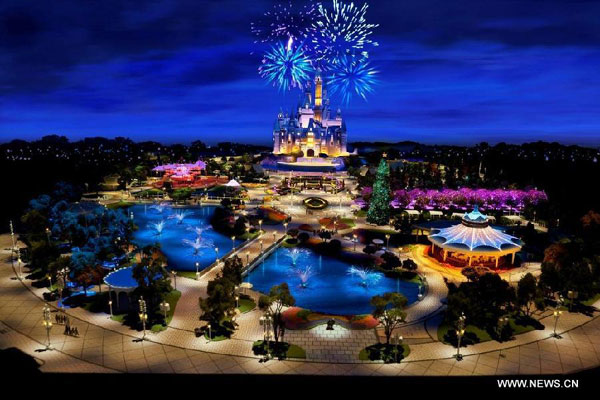 |
|
Photo shows a rendering of the model of the Shanghai Disney Resort in Shanghai, East China. [Photo/Xinhua] |
Huge potential for growth as people seek more diversified entertainment options
It was all supposed to be so much fun for investors, but for many the financial swings and roundabouts of the Chinese entertainment, leisure and tourism industry were as amusing as a stomach-churning ride on a roller coaster.
But that is changing as the industry begins to turn into the moneymaker it had always promised to be.
Riding this wave, theme parks that had been losing money are brimming with confidence as the country's swelling middle class realize that when they want to escape the humdrum of life, a visit to a theme park is not a bad option, and is relatively cheap as well.
Industry experts say that in recent years, China's theme park business has grown much more quickly than that of most countries, which may partly reflect the world's economic woes forcing consumers to crimp on their discretionary spending. Given the country's size and population, the themed entertainment industry has huge potential for growth, experts say.
The International Association of Amusement Parks and Attractions says that 180 million people went through the turnstiles of theme parks in China in 2013, 6 percent more than in the previous year. It predicts that the number of visits will surpass 320 million a year by 2020, overtaking the figure in the United States.
"About 700 million Chinese can now afford to visit theme parks," says Chris Yoshii, vice-president of AECOM, a Hong Kong consulting firm. As incomes continue to grow, that figure is forecast to shoot up to 1 billion in the next five years, he says.
Not only is China's emerging middle class increasingly attracted to theme parks, but it has nothing against spending as much as $31 on an entrance ticket, he says.
"Based on increasing population in the middle and upper income groups, and booming tourism, we expect the theme park market to have doubled from 2010 to 2015, and nearly double again from 2015 to 2020," Yoshii says.
The resurgence in the industry is thanks in part to a change of heart by the central government in 2013 when it lifted a ban on approvals for new theme park projects that had been imposed in 2011.
As developers and local governments sought to add entertainment facilities to commercial centers, resorts and residential communities, the number of theme park and water park projects began to surge.
The Chinese Culture and Media Industry Investment Report says China had more than 3,000 theme parks last year, almost one third of them less than two years old.
